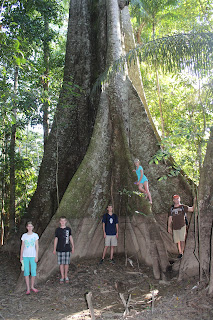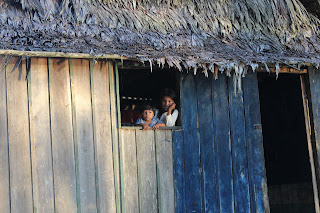We awoke just as the sun was rising. Cousin Andrew opted for the option to sleep in but the other three jumped at the idea of going for a morning "bird watching" boat ride.
Bleary eyed, we got in a dug out canoe, grabbed a paddle and made our way out of the small stream to the larger bayou. We enjoyed watching nature come awake. Birds darted around fishing for their breakfast. Hawks, Eagles, King Fishers, and a myriad of other small birds flittered around.
As we pulled back into camp I noticed the other group getting ready to head out for an outing. As they settled into their little canone, their guide came walking down the path with a small motor thrown over his shoulder. SERIOUSLY??? We've been paddling all over creation, trying not to tip over and encouraging the kids to "keep at it" and we could have had a motor? OK. I am actually glad that we put our muscle into our activities getting around by our own manpower. And how peaceful is it to early morning bird watch with a motor buzzing away?
Breakfast presented a bit of a disappointment. Corn in the scrambled eggs. yuck. I picked around the corn, nibbled at an arepa and filled up on fruit juice. I am discovering that I am a bit soft in the food department. The older I get the more particular I am becoming with what I put in my mouth. I don't think I could have popped weevils in a concentration camp to survive. I just don't think I have it in me.
We had a nice relaxing morning of hanging out in hammocks, and after a good lunch we got back into our blue and yellow canoe with a motor and headed out to see a "big tree, take a hike and visit an indigenous village".
 |
| "The big tree" |
 |
| Damon climbing the vine |
First stop was the "big tree". I don't remember what type it was, but definitely amazingly large. We walked around discovering a bat cave inside the trunk. On another side a vine twisted up the side. All the boys gave a try climbing up Tarzan style. Looking up made me a bit dizzy.
Before leaving camp I had quizzed our guide on appropriate foot wear for the hike. Flip flops, tennis shoes or boots? He assured me it would be a nice, packed trail and flip flops would be a good option. Nope, a few minutes into the hike we discovered that the receding water had left a thick mixture of clay and mud. Soon we ditched our flip flops and barefooted it with each step sinking in past our ankles. The thick slurping sound of the mud followed each slow, tedious step we took. About every 20 minutes our guide would stop and look around. We appeared to be at a dead end. He would tell us to "just wait here a minute", then start hacking in all directions at the growth. Eventually he felt the trail had been found and off we would go, sluffing through the mud. What was supposed to be an hour hike turned into two. I was actually completely amazed when suddenly with one hack of his machette we stepped into a village. I had been a bit nervous as the sun was getting lower on the horizon. My mind had been going places like "How do we keep the kids safe and warm tonight?".
 |
| Hacking through the Amazon |
 |
| Note the mud up our legs |

To be considered an indigenous village by the government of Peru you must speak your native language as well as fish and hunt in the traditional way. About 200 Yagua people lived in Santa Rita, Peru. They had been hit very hard by the flooding of the river this year with the water level rising to a few feet into their houses. These houses are high up on the bank and on stilts. Outside of building your house in a tree, what else can one do? A woman carrying her baby greeted us. I was struck by her gentle manner and an aura of peace and happiness about her. She showed us her crafts and we picked out a few piranha jaw necklaces. We lingered a bit and began wandering on. We noticed our guide deep in conversation with the woman then they disappeared a few moments later with a cup of yucca juice. The creamy, white liquid wasn't really that bad. South Americans love their juices.

We continued on and once again our guide excitedly told us the woman had invited us into her home to "see something special". The homes in this town were very minimal. Wood buildings with straw roofs built on stilts. Inside a hammock was strung-up to rest in, a picture on the wall and a few essential tools. The kitchen was immaculately clean with pots and pans hanging on the wall. I was struck from the moment we stepped foot in this village with the cleanliness. No garbage littered the path. Yards were tidy and the houses taken care of. They didn't have much in the way of worldly possessions, but they held a pride to their village. It showed in how the village looked and the joy of every person we encountered.

As we walked into the kitchen we saw a very large fish laying on the floor. The pirarucu is a tropical freshwater fish found in South America. Because of heavy commercial fishing in the early 1900's it's numbers are low and only the indigenous are allowed to catch it for consumption. It's considered a delicacy because of its large, boneless steaks. The village had just caught this fish that afternoon. The fish swims on the surface of the water so in their tippy canoes they come-up along side of the fish and spear it. 6-10 of these fish are caught by the village a year. It was a very special treat to be in the village on the day of the catch! We had everyone lay next to the fish for a picture. The fish was larger than all of us! The scales were the size of a hockey puck.
The sun was now getting low. The sky turned brilliant shades of orange. A volleyball game broke out. We got back in our boat headed to camp.

Soon it was pitch black as we slowly made our way down the rivers. Prime time for cayman hunting! Our guide had a spot light that he swung back and forth across the banks of the river. I kept thinking "You're never going to find anything, you're swinging that light way too fast.". But he knew what he was looking for and before I could blink he had zeroed in on what looked like a red glowing marble in the distance. The driver headed that way. The guide lay suspended over the bow, his feet hooked in the sides. He snatched at something but missed. We continued in this fashion for about 30 min. Spot the red eye, creep over, snatch and miss. The next sighting we creeped over all of us hanging over the edge to see the cayman. The next thing I knew, my husband was in the river proudly holding up an 18" cayman. What happened?? He hopped back in and we all got a good look at it. The driver showed us how strong the jaw is on even a small cayman like this one. Pictures taken, relief that Chad still had all his appendages we settled back to enjoy the rest of the boat ride home.

I sat down in the bottom of the boat, put my head back on the side and gazed at the clear sky and full moon above. The stars sparkled brilliantly. I spotted the Southern Cross constellation. This constellation always brings a warm feeling - the familiar memories of spotting it while in NZ. I was in a state of complete relaxation.
Wack. Something hit me in the side of the head. The peaceful moment became a distant memory as I watched Chad and Damon scramble on the floor of the boat trying to get the fish that were jumping in. About 45 minutes later and 30 fish thrown back in the river with another 30 dead under the floor boards we arrived back at camp.
The other group was standing on the shore holding a very small cayman. They were having fun looking at it.
"Did you catch it?" I asked.
"No, our guide wouldn't let us."
"What did you do today?"
"We saw a big tree and an indigenous village." They replied.
"Did you hike from the tree to the village?" I questioned.
"No, our guide said it would be too muddy." (You think??)
"Did you see the big fish?"
"No, there was a big fish?"
Do I think they really experienced the Amazon, peddling around with a motor, not doing muddy hikes, not jumping into the river and not being bold enough to develop a quick relationship with the villagers to see their big fish? Nope, we had the best day of all. One that will live on in our memories and growing into tall tales as all true adventures do!
- No worries, Kris





















































